Witnessing a car accident first-hand requires a calm, cool, and collected response under traumatic circumstances. Your course of action will largely depend on the severity of the crash and the extent of the injuries, but there are some general guidelines to keep in mind. By following these tips, you’ll be better prepared to help your fellow drivers until the professional emergency responders arrive.
Ensure Your Safety First
If you are driving when you spot a car crash, pull over to the side of the road at least 100 feet from the scene and put on your hazard lights. You want to give enough distance so you don’t put yourself in danger of broken glass, leaked fuel, or flames.
Call 911
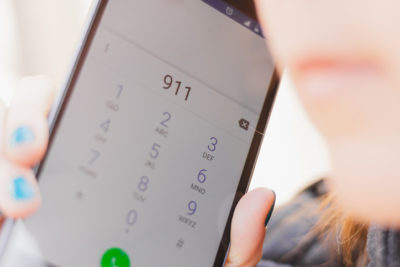 Never assume that someone else already called 911. Even if the wreck doesn’t appear severe, the authorities should be notified. Let the 911 operator know you witnessed a car accident, the location, number of people involved, and any other pertinent details.
Never assume that someone else already called 911. Even if the wreck doesn’t appear severe, the authorities should be notified. Let the 911 operator know you witnessed a car accident, the location, number of people involved, and any other pertinent details.
Check On The Victims
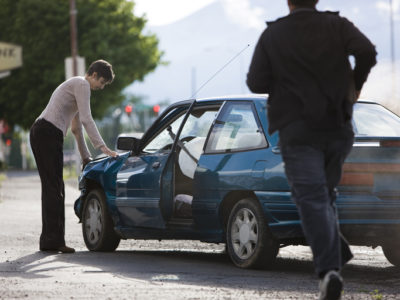
Once you’ve ensured that it’s safe to approach the scene, check on the condition of the crash victims to make sure they are okay and offer help, if you are able. While this can be an emotionally taxing time, try to stick to the facts and remember that this is not the time to assess who is at fault for the accident or make judgments on what the other driver must have been thinking. A good rule of thumb is to never admit fault at the scene. Unless there’s a risk of the vehicle catching fire, do not under any circumstances move an injured person. Despite your best intentions, you could accidentally make the injury worse. Let the trained medical professionals tend to the injuries, but you can provide comfort by reassuring victims that help is on the way.
Stabilize The Vehicles (If You Can)
If the accident is minor, ask the driver to put the impacted vehicle in “park” and turn off the ignition. This will eliminate the risk of fire, especially since chances are good that the crash has caused an oil, fuel or coolant leak. If it’s safe to do so, enlist help to move the car out of further harm’s way and to leave space for other vehicles and emergency responders. If that’s not possible, set up flares or traffic triangles to warn other drivers of the accident.
Give A Statement & Provide Your Contact Information
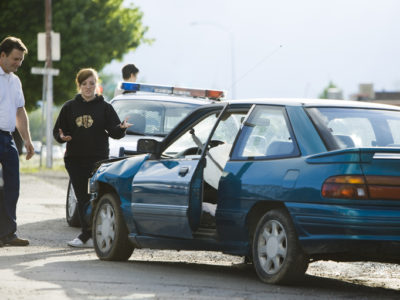 When the police arrive, provide the relevant facts and your contact information. In the days and weeks following the event, you may be contacted as a witness by legal and medical authorities and/or insurance claims agents. Be honest, factual, and consistent with your statements.
When the police arrive, provide the relevant facts and your contact information. In the days and weeks following the event, you may be contacted as a witness by legal and medical authorities and/or insurance claims agents. Be honest, factual, and consistent with your statements.
Car accidents can be upsetting for the victim and the bystander alike. The best way to deal with an accident is to stay on the scene and report what you’ve seen. Only exit your vehicle to render aid if it is safe to do so. Your clearheaded actions to safely assist or protect the victims until emergency assistance arrives can make an enormous difference in the overall outcome.
Being in an accident might be stressful, but GEICO Mobile makes the claims process easy. Download it today in the App Store or Google Play.
By Stephanie Levis

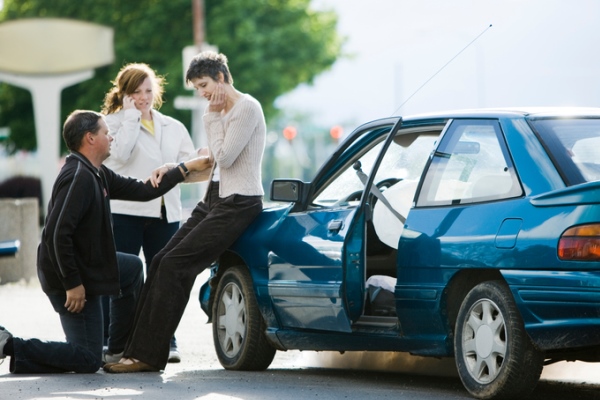


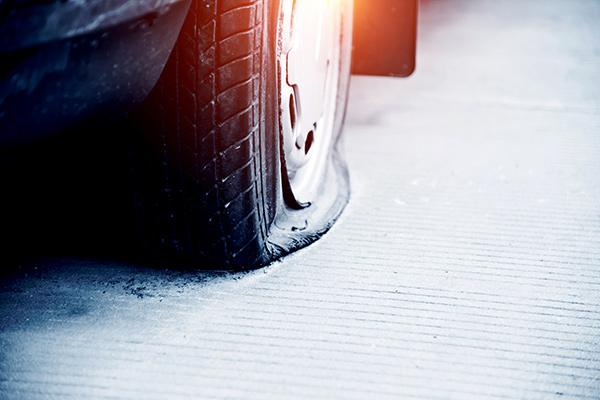
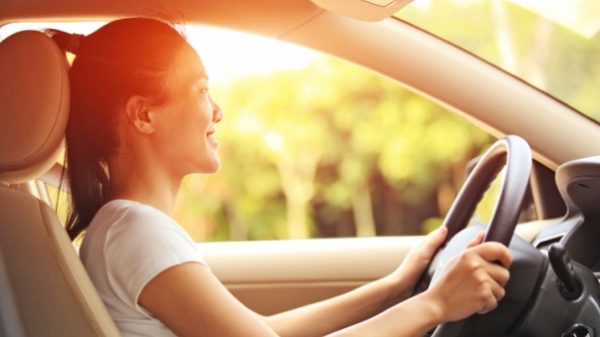
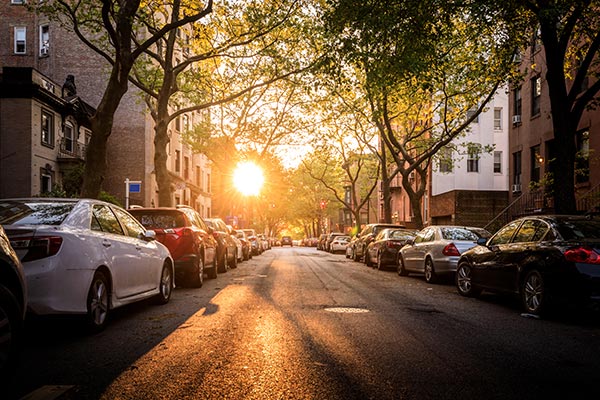
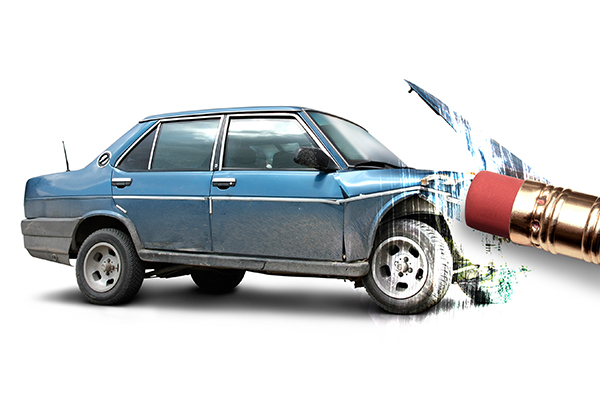
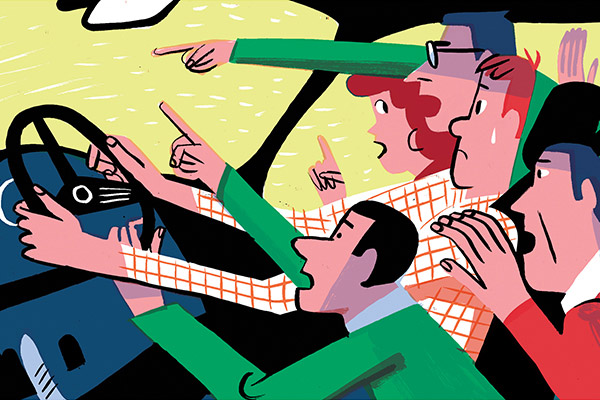
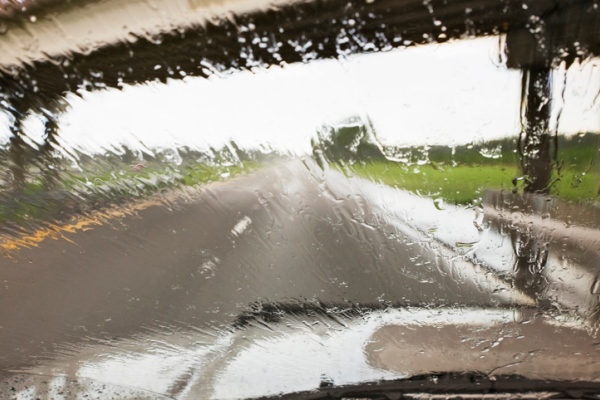
Edy lajara says,
Very helpful ideas. I keep them in mind
Morgan says,
As a firefighter I appreciate this post in making people aware of what to do when they witness accidents. One thing I want to add would be if there is a fatal accident please do not touch ANYTHING!! Every piece of information is important to the police and detectives who will be further investigating the accident!
Marshall says,
Thank you for publishing this – it will be very helpful to know should I ever be in that situation.
Donna Ancar says,
It would have been great if you had set up the page to be printable. I would keep a copy in the glove box of each of our vehicles. Maybe you could send a copy to every school that has drivers’ ed classes!
Marshall says,
Great tip Donna – it got me to right click on my Win 10 system and print it out!
Nathan says,
Donna,
You can copy all, clip and paste into Word, and have it as a doc.
I then sent it on to all my children.
Your idea to drivers ed is great.
Nathan
doug says,
NOt clear if this is for someone who is IN the accident. I always thought the ins companies told you not to speak to any one.
Pilla says,
Please note title of article. You’re a witness to and NOT IN a car accident.
Geico always put out useful and interesting articles. Thank you.
Pavan says,
So Helpful instructions.
Jerry says,
Thes are all very good things to do.
JOni says,
Love this idea. I always wish Radio stations and Sirius XM would drop a few of the driving safety/courtesy tips. Like how to zipper politely and to turn on head lights when your windshield wipers are on and who goes first when you arrive at a four way stop at the same time! What does a solid white line mean. You pass when the yellow broken line is on your side and the solid line is farther away from you. That kind of stuff!
Alicia says,
That would actually be really smart and a good idea too!
Roddey says,
Hey Geico — I’d encourage you to add one more checklist item to your list…to further protect your members from inaccurate reporting from the other driver(s). If you have a smartphone, then record a video of the other driver(s) account of the accident. This may prove to be invaluable as you move forward with your claim. OR…..request a police officer to come to the accident to get an official record on the accounts of the accident.
The SFPD told me as long as I was not injured and the other driver was cooperating to move the cars to a safe place and exchange information. This proved to be detrimental to my claim moving forward, as their was no official record of the other driver confessing his negligent driving which led to the accident. I had a picture of his license plate and driver’s license, but he changed his story to his insurance agent and they fought the claim from his “new” position of the accident. Long story short, kindly request to get the other driver(s) account of the accident on video. Drive safe!
Angel says,
Recordings are usually not admissible in court. You have to ask the person if it’s okay to record them. Also they can claim they were under diress. Never bad just to have it cause it’s ultimately up to the judge, but an attorney will fight it and get that evidence thrown out and it not be admissible. Then if the person was injured, especially head injury, they may have been unclear and foggy headed and/or details not be clear or even confused. Either way if you plan on not calling the police exchange insurance info. If you are really uncertain, just call the police. Always better to be safe than sorry.
Michael Richman says,
I think it is very important that if one witnesses an accident they should remain on the scene to provide as much assistance to all parties. When the police come to assist one much be careful not to raise an opinion but just provide exactly what they saw and noting more. Its useful to remember that if the case should go to court you could be subject to all sorts of uncomfortable questions that could be offensive and also infringe on the personal side of ones life. Tell the truth and tell what you saw and noting else. Never render a person opinion.
Jerry says,
good idea,call the police.
Paul Lunis says,
Very useful. It’s like a refreshing course. Plan to e-mail to friends.
Martha Brothers says,
If someone hits you if you have a camera take a picture of their driver’s license. Someone hit me back in November and ALL the info he wrote down for me was a LIE. You just can’t trust that people will tell you the truth. Therefore, I was out the money to repair the car myself.
Marti says,
Good idea !!
Jerry says,
good idea
Amanda says,
That’s a great idea!
Sharon says,
In response to CJ, I thought it was an offense if you leave the scene of the accident if you witnessed it??? I better search the laws in Florida so I am not wrong…. especially in this #1 law suit state.
Charles says,
What to do when you witness an accident? Just keep driving…In many states you can be held liable if you try to administer aid.
Martha Brothers says,
There’s such a thing as Good Samaritan laws. You can’t be prosecuted if you act in good faith to save someone.
Bart Simmons says,
But … you can be liable should injury be worsened by your well meaning intentions. In one case, good samaratins moved an injured person out of concern that a fire would erupt. Fire did not erupt, but the move was claimed to have aggravated a spinal injury. As the good samaratins were not professionals trained for rescue, they were found by jury to have committed an injudicious act resulting in new injuries.
Marti says,
That’s awful
anonymous says,
We once came across and accident, just one vehicle, and we stopped and thank God we did because just so happened it was our friends dad and he was ejected from the vehicle and it was a very bloody scene. If we wouldn’t have stopped he would be dead today. He was hospitalized for weeks and physical therapy. So NO please don’t just keep driving if we would have done that we would forever have to deal with the reality we could have helped our friends dad who would be dead.
Richard says,
A s a former 1st responder, we get sued too. My opinion is that a person life is worth the risk if YOU believe that inactivity will endanger the victim more. One thing I might add is that as an EMT and licensed medical professional, I am required to render assistance. All should remember if you have someone like me there, listen and follow directions.
W.T. says,
Is that verifiable or something you ‘heard”? If you act in good faith you cannot be held liable in most states.
CJ says,
One objection: The continued references to “rely on the trained professionals” is very naïve. If you witness a car accident, give your contact information TO THE DRIVERS, especially to the one who seems to be the victim of the other. Don’t waste your time waiting for the police to arrive or finally getting around to ask you what you saw, You can spend a couple hours doing that (If they ever ask you at all). Rest assured the police report will probably be wrong anyway. I wish it was differently, but these are the realities. When I was young I believed like the author does, but since then I’ve seen too many times how things too often go. Whenever possible, follow your first impression to help the drivers and victims. Give your contact info to them. Don’t wait for “the professionals”.
James says,
CJ:
What you’re saying is true in some cases, but not all the time. I’ve been a witness to several serious accidents, and stayed until the police & EMS units arrived. The police were especially happy to have an independent witness who could provide details neither driver was able to. Everyone has their own level of compassion and willingness to get involved, and will have to decide for themselves when to stop and render aid. I can honestly say that in my case I was glad I helped, and that that help was appreciated.
Richard says,
Unfortunately no good deed goes unpunished. I have experienced people doing the most awful things , changing stories and out right lying. Trust no one, here they don’t even make a report unless someone is injured. No report, how do you prove what happened? And then the greedy people will come out of the woodwork, even the passengers. Don’t get me started, just pray you don’t have an accident, even if its not your fault, it will cost you.
Angela Ensalaco says,
Most police reports accurately present the information that the officer is provided. But when people lie to the officers then tell another lie to the attorney, another lie to the insurance company, etc…they then claim the officer is providing false information. The officer is only providing what he was informed of by others. If there is false info that is because of people telling lies to the officers.
You stay and provide honest info to the officers. I have found people like you CJ are often wrong in the so called assistance that you give to others. Let the trained professionals handle the situation.